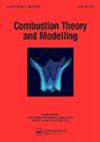A reduced kinetic scheme for methyl methacrylate gas-phase combustion
IF 1.6
4区 工程技术
Q4 ENERGY & FUELS
引用次数: 1
Abstract
Gas-phase combustion of methylmethacrylate (MMA) monomer is an essential stage of solid polymethylmethacrylate (PMMA) combustion, which is of interest in many applications. A skeletal kinetic scheme for MMA combustion in air is proposed including 44 irreversible elementary reactions for 29 species. The mechanism is derived from the reduced kinetic scheme for MMA oxidation comprised of 263 reactions for 66 components. In this work, the mechanism predictive capabilities are demonstrated by solving the self-ignition problem, as well as the premixed flame propagation problem for MMA-air mixtures. It is shown that the skeletal mechanism overpredicts the ignition delay times due to significant simplification of the MMA decomposition stage reaction pathways. The flame propagation speed is predicted reasonably for lean and nearly-stoichiometric mixtures, but overpredicted for fuel-rich mixtures. Also, a diffusion flame representing the cup burner of liquid MMA is simulated in two-dimensional statement of the problem, the results are shown to agree well with the measurements and numerical simulations performed earlier on the basis of a detailed kinetic scheme. The skeletal mechanism can be used in the numerical simulations of gas-phase combustion of MMA, including the problems of flame propagation over the solid PMMA polymer.甲基丙烯酸甲酯气相燃烧的还原动力学方案
甲基丙烯酸甲酯(MMA)单体的气相燃烧是固体聚甲基丙烯酸甲酯(PMMA)燃烧的重要阶段,在许多应用中都引起了人们的兴趣。提出了MMA在空气中燃烧的骨架动力学方案,包括29种物质的44个不可逆的基本反应。该机理来源于MMA氧化的还原动力学方案,该方案包括66种组分的263个反应。在这项工作中,通过解决MMA空气混合物的自燃问题和预混火焰传播问题,证明了其机理预测能力。结果表明,由于MMA分解阶段反应途径的显著简化,骨架机制高估了点火延迟时间。对于贫燃料和接近化学计量的混合物,火焰传播速度是合理预测的,但对于富燃料的混合物,则预测过高。此外,在问题的二维陈述中模拟了代表液态MMA杯形燃烧器的扩散火焰,结果与之前基于详细的动力学方案进行的测量和数值模拟非常一致。骨架机制可用于MMA气相燃烧的数值模拟,包括火焰在固体PMMA聚合物上传播的问题。
本文章由计算机程序翻译,如有差异,请以英文原文为准。
求助全文
约1分钟内获得全文
求助全文
来源期刊

Combustion Theory and Modelling
工程技术-工程:化工
CiteScore
3.00
自引率
7.70%
发文量
38
审稿时长
6 months
期刊介绍:
Combustion Theory and Modelling is a leading international journal devoted to the application of mathematical modelling, numerical simulation and experimental techniques to the study of combustion. Articles can cover a wide range of topics, such as: premixed laminar flames, laminar diffusion flames, turbulent combustion, fires, chemical kinetics, pollutant formation, microgravity, materials synthesis, chemical vapour deposition, catalysis, droplet and spray combustion, detonation dynamics, thermal explosions, ignition, energetic materials and propellants, burners and engine combustion. A diverse spectrum of mathematical methods may also be used, including large scale numerical simulation, hybrid computational schemes, front tracking, adaptive mesh refinement, optimized parallel computation, asymptotic methods and singular perturbation techniques, bifurcation theory, optimization methods, dynamical systems theory, cellular automata and discrete methods and probabilistic and statistical methods. Experimental studies that employ intrusive or nonintrusive diagnostics and are published in the Journal should be closely related to theoretical issues, by highlighting fundamental theoretical questions or by providing a sound basis for comparison with theory.
 求助内容:
求助内容: 应助结果提醒方式:
应助结果提醒方式:


